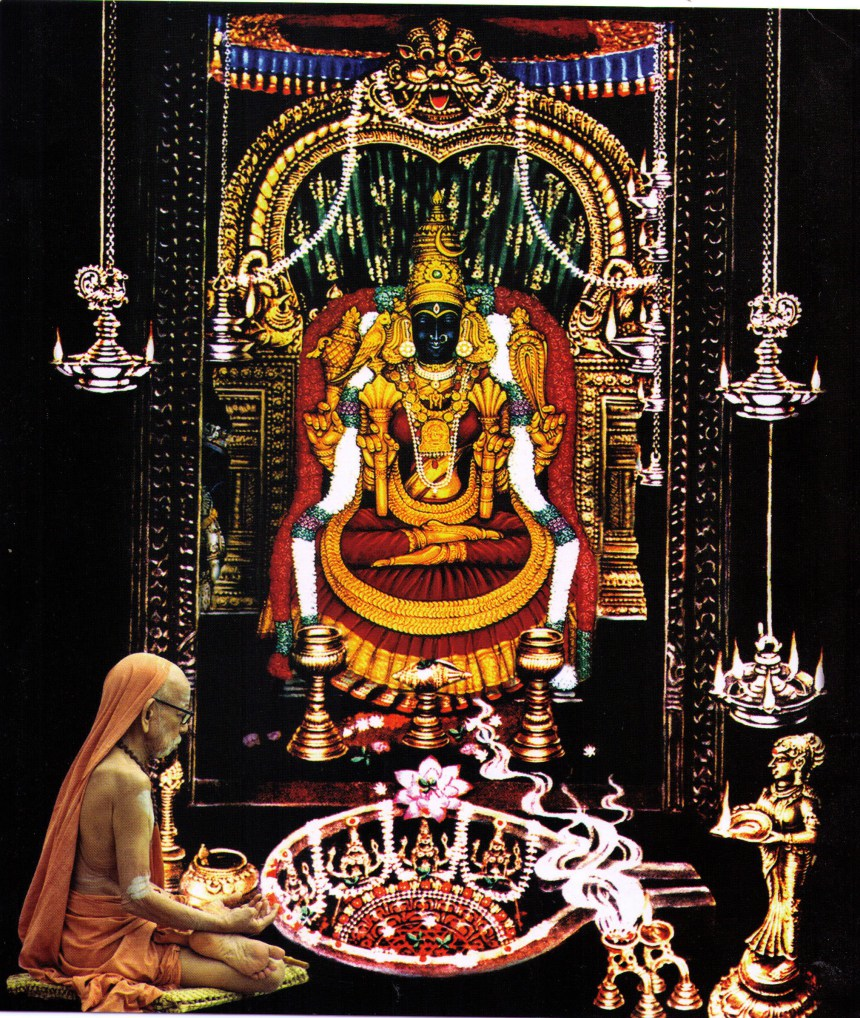As we have already seen, Udayana and other supporters of the Nyaya system criticised Buddhism on the score that it was silent on the question of God, while mimamsakas like Kumarilabhatta attacked the same because it did not favour Vedic rituals. The acarya was in sympathy with these views and believed that Vedic sacraments, considered all-important by the mimamsakas were essential to the cleansing of the mind and to the proper conduct of the affairs of the community. However, he was opposed to the mimamsakas not only because they did not accept an entity like Isvara as the dispenser of the fruits of our actions but also because they did not believe that, after being rendered pure by works, there is any need for one to go further and take the path of jnana. He also did not agree with their view that to become a sanyasin giving up all karma is not right.
Kumarilabhatta and Mandanamisra are particularly important among the mimamsakas. The Acarya had a debate with Kumarilabhatta during the last days of that mimamsaka and won him over to his viewpoint. Similarly, Mandanamisra also became a convert to Advaita Vedanta and came to be one of the Acarya's chief disciples assuming the title of Suresvaracarya.
If the Acarya opposed Mimamsa, which is one of the fourteen branches of Vedic lore, it was not because he thought it to be wholly unacceptable. He was in agreement with the sacraments dealt with in that system, but he differed from it on the question of devotion to the Lord. He further believed that the fruits yielded by the rites, rewards like paradise, must be dedicated to Isvara and that in this very act of renunciation the mind is purified. Sankara's teaching is this: it is only if we realise that Isvara is the Phala-data, the one who awards the fruits of our actions, that we will not be tempted by petty rewards like paradise. Only then will we be inspired to go beyond to attain the higher reward of inner purity. The Vedic works were wholly acceptable to our Acarya. But for the mimamsakas they were an end in themselves; they did not transcend them to become devoted to the Supreme Godhead and to acquire jnana, the final realisation that Isvara and we are one and the same. Sankara criticised mimamsakas for their failure to understand this truth. That he did not oppose Vedic karma is proved again by the fact that in his upadesa (teaching) -it is called Sopana-Panchaka- before giving up his body he made the admonishment that the Vedas must be chanted every day and that the rites mentioned in them must be performed.
Vedo nityam adhiyatam
Taduditam karma svanushtiyatham
The Acarya, however, taught us not to stop with karma (performed for the sake of karma), but to go beyond it. The rites that we conduct must be made an offering to Isvara. This is a means of obtaining inner purity and also that of receiving instruction in jnana. That is the time when we must give up all karma to meditate upon the teaching we have received, indeed meditate on it with intensity and make it our inner experiential reality. Sankara takes us, step by step, in this way to final release. He opposed the mimamsakas because they failed to understand the purpose of Vedic karma and refused to go beyond it.
We must accept the Mimamsa system's interpretation of the Vedas, especially because it surrenders wholly to the "Sabda-pramana", the sound of the Vedas, its authority, and it is in this spirit that it has understood the meaning of the scripture. An interesting thought occurs to me. Mimamsa does not surrender to a perceptible God nor seek to understand his form. Does that matter? The Vedas themselves constitute a great deity. The sound of the Vedas does not take the form of a deity that can be seen with our eyes but one that can be perceived with our ears. Let us perform the works that that sound bids us to do without asking questions. Such an act implies an attitude of surrender and it is in this spirit that the mimamsakas have determined the meaning of the Vedas. So whether or not they believed in a tangible God, they knew the God that could be grasped by the ears. (that is they had a good understanding of the meaning of the Vedas).

